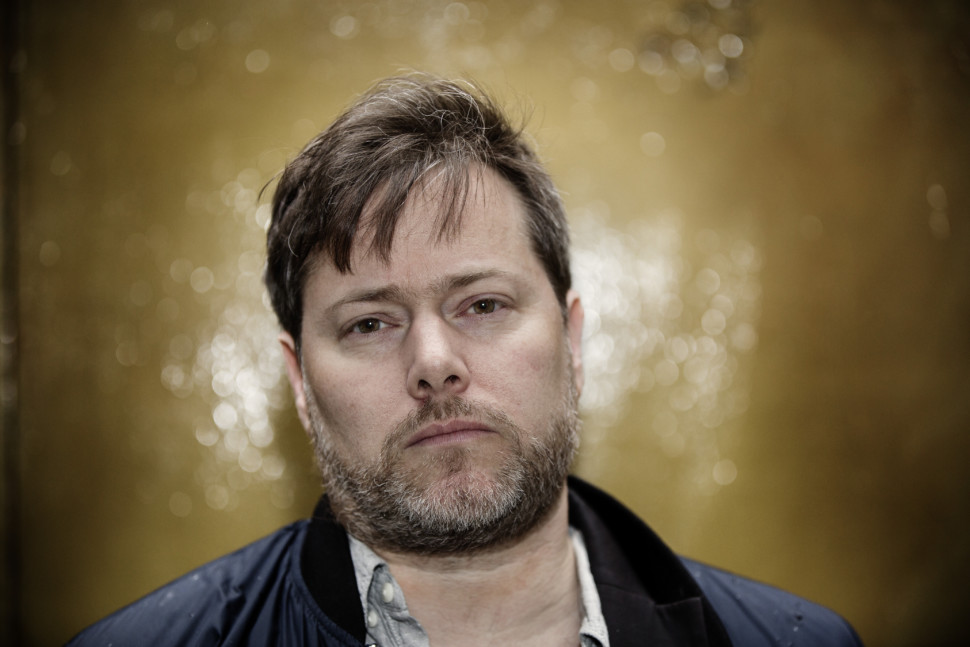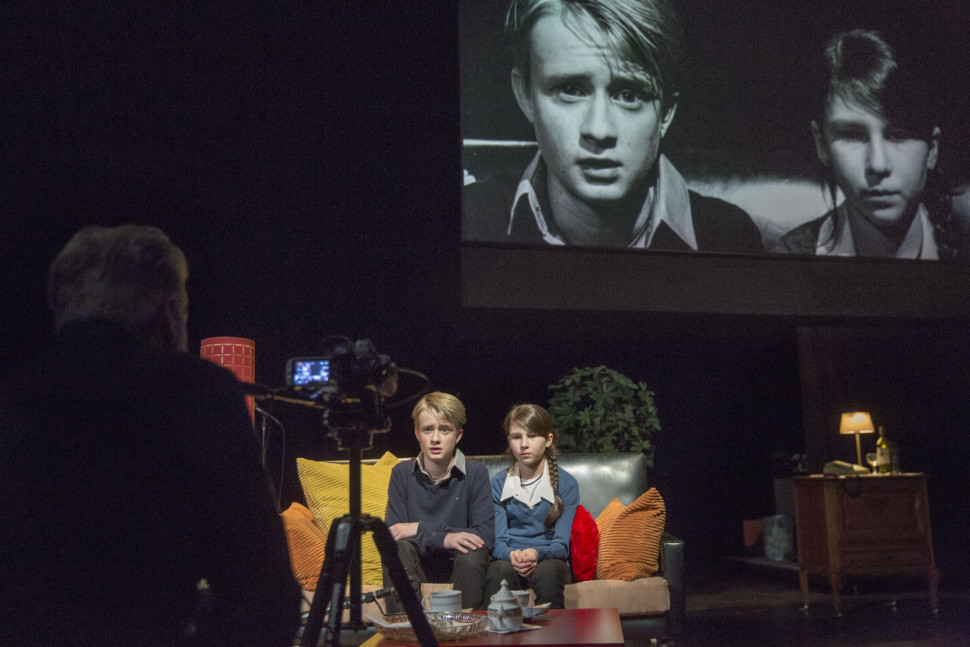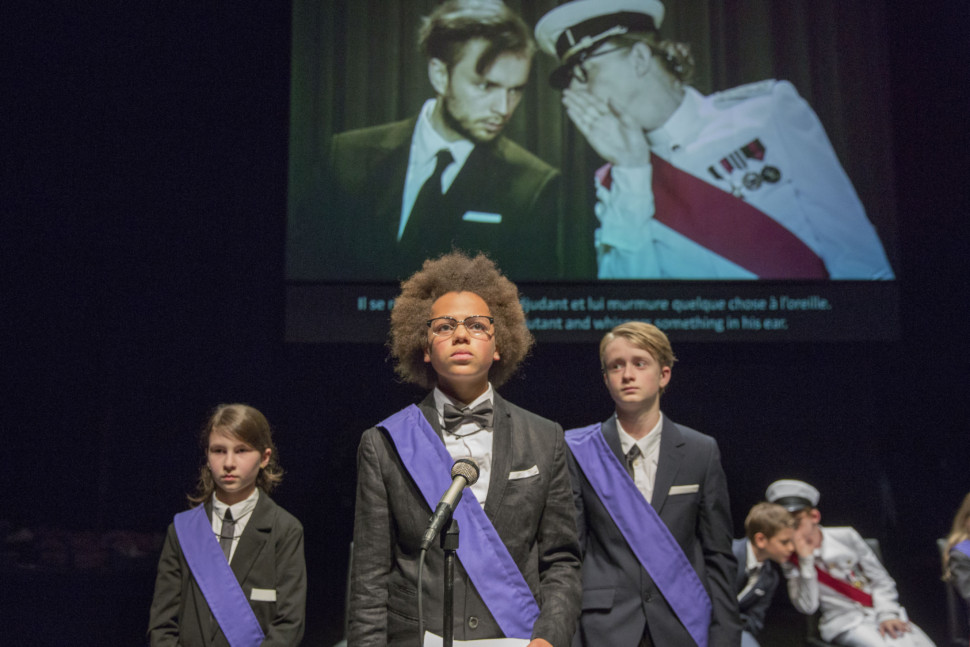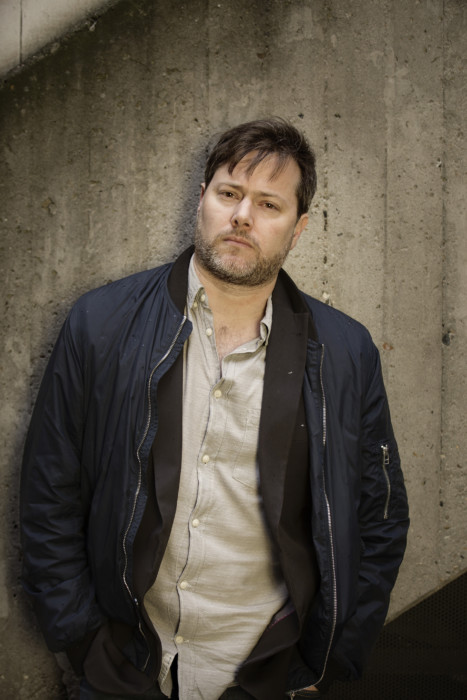
Stage: communicatie & sociale media
13 Maa 2024
vr 01 sep 2017
I’ve met with Swiss director and future head of NTGent Milo Rau (40) on a sultry summer evening. I encountered him at the cafe terrace in the company of the other two boyband members, Steven Heene and Stefan Bläske. After some refreshing drinks and chit-chat together, I take Milo to a quiet spot in the open air and I gently shoot my questions.
Dina Dooreman

(c) Phile Deprez
Five Easy Pieces has been selected for the TheaterFestival. The show has already been awarded several times, including the 3sat-Preis at the Theatertreffen in Berlin. Why do you think this production is so successful?
I believe there are several reasons but I guess the main reason is the fact that it is really touching. For myself, for people who are not trained in theatre, but as well for sophisticated theater critics. They will be touched and shocked as well. It is a very curious case because it stages one of the last taboos existing: pedophilia. I remember a critic from Berlin saying: ‘it is really interesting how the story is told in so many different ways. First of all associatively but simultaneously it goes very straight to the core of the topic’. I think this is the reason why it works from here to even Singapore. Everybody can understand it, just like a fairy tale. Because the play has the same directness and at the same time, on a meta level, it talks about voyeurism, violence, the meaning of theater and the relation between the director and the actor. For me personally it was also an essay or summarization of the work I did over the past years.
Do you think the impact of the show will be different for Belgian audience members from the international audience members?
Of course. Belgian spectators know these tragic events took place not that long ago. The young actors for example grew up with it and as a result know a lot about it. But for them it is more like an old tale from ancient times. You can compare it to reading Richard III or the brothers Grimm. People are not traumatized by reading these brutal stories because they know they are fictional. Marc Dutroux is a Shakespearean character in a way. Even though his case is actual reality: he still lives in prison and many others who were involved are still alive, even the two surviving girls. So, for the Belgian audience it is interesting because it stages a part of the national history of the country. At the same time it raises universal questions: how can we reproduce feelings that occur during such tragic events? And how can we overcome that trauma?

© Phile Deprez
One of the strategies you often apply is the re-enactment. Why is it so meaningful to you, and how is it different from other forms of storytelling?
The re-enactments I create are totally fictional. We have in the Dutroux-case no idea what actually happened. But we created the scenes based on actual facts. The re-enactments are a way to examine and reproduce human feelings. The camera is in that sense a good theatrical tool because it helps transfer facial expressions. And I am in love with the human face. That means you can be close to the stage and at the same time show the total picture. The first rehearsal exercise I did was showing Ingmar Bergman’s Scenes from a Marriage. I asked the young actors to copy the gestures and movements of the characters. That’s when the Brechtian concept of Verfremdung took place. There was a distance from the emotions because the children had no idea what they were playing as they did not have the experience and sometimes did not even understand the words that were used. This exercise I applied as the structural basis of the show.
The age of the children in the show range from 8-13 years old and is similar to the one of the Dutroux’ victims. An age that balances on the verge of childhood and puberty/adulthood. Would it have made a significant difference if the actors were either younger or older?
It’s difficult to say. Currently, we are rehearsing with a new cast because the international touring is getting too much for the original cast. We are also rewriting a bit of their personal stories as some of the new actors have a different cultural background. One of the new girls for example is of East-Asian origin. Some of the children are also becoming too old and then the difference between adult and child starts to disappear. Besides, in this case the play might have been less of a fairy tale and perhaps more brutal and sadistic. On the other hand, when the actors are too young they do not understand what they are doing. Actually, the production was an exercise for me as well. As a director I had to train these children how to act, to be present and to listen on stage. It is very different from working with professional actors. They just act out my directions and then the existential question is not present. Five Easy Pieces is in that sense a classical Lehrstück. A play where the actors learn from being on stage. The five pieces are five different theater schools. The first for example is mimicry and method acting. In this part, one of the actors has to play an old man in Robert De Niro-style with a heavy accent.
Are you planning on working with children again in the future?
Yes, I have plans to make a show called La Reprise for the first season at NTGent. It is again centered around a crime against children. There have been several cases in which parents found themselves in emotional darkness and kill their own children after a split-up. I am personally intrigued by stories of this kind because I am a father of two daughters myself. I was extremely touched by Helen Garner’s This House of Grief which is based on the trial of a father who is accused of murdering his three sons. It is truly horrible. I believe killing your own children is the most tragic crime. It is different from what Dutroux did because it is also a story of a relationship: that of the parent and the child.

© Phile Deprez
La Reprise will premiere in a few years. What are your plans for the near future?
I am currently working on 1917- Exhibition of a Revolution that will be shown on the 19th of October at the Schaubühne Berlin. It will be a fictional film of 90 minutes portraying Lenin during his last days. I want to create an atmosphere similar to horror and ghost movies. While Lenin is lying on the deathbed, major characters from his life pass by: his wife, his doctor, Lenin and even Leon Trotski. Then on the 3 5th of November we will set up the General Assembly where 60 delegates from all over the world gather for the first world parliament ever. A live stream will be organized in Munich, Paris, Ghent and Brussels among others. We will complete the project with an assault on the Reichstag. In February Jeanne D’arc will premiere at the Residenztheater and the rehearsals for History of Theater for the Kunstenfestivaldesarts 2018 will kick off.
The final question. Soon it will be the first time you’re leading a theater house: how are you preparing for your function as the artistic director of NTGent and will it change your approach to theater-making?
At the moment I am writing a manifest for NTGent that will be published next spring. I am reflecting on what theater and producing means. What are the requirements for a state theater and an ensemble? How to deal with theatrical tradition, text and documentary? I think it is important that an artistic director not only programs and exhibits plays but also produces them. And so I will keep on producing my own shows while being aware of and respect the Flemish theater tradition. I must confess I actually prefer the more naturalistic way of acting in Flanders over German’s dramatic exaggeration. I appreciate how actors and not the director are the center of the show. In my productions as well, I build up around the stories of the actors. Anyhow, my manifest will be similar to the one of Dogma 95. It will be just as technical but not so dictatorial. (laughing)
Read here about the music used in Five Easy Pieces

(c) Phile Deprez
